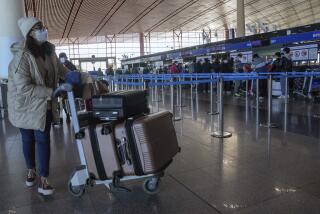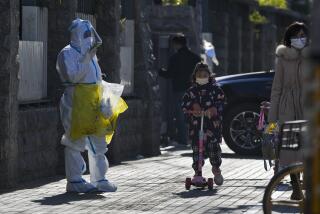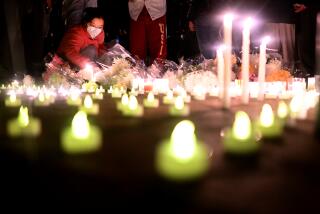Toxic smog hangs over large swath of China but many ignore threat
BEIJING – To mask or not to mask -- that is still a question.
A huge swath of northeast China -- more than 10% of the country’s landmass -- is again engulfed in toxic smog. Beijing’s air quality index, as measured by the U.S. Embassy, hit “hazardous” territory for a sixth day running Tuesday. No relief is expected in the capital until at least Thursday.
The murky gray haze cut visibility on roads, reduced the sun to a faint, moon-like tangerine orb in the sky and prompted the city to issue an “orange alert” -- one step away from the most serious level, red.
About 150 industrial companies have either halted or curbed production to cut down on emissions, Beijing has dispatched tanker trucks to spray roads with water to reduce particulates and the state-run Xinhua news agency is reminding people to avoid outdoor activities and to wear masks.
Yet for an 84-year-old exercise enthusiast working out Tuesday afternoon in central Beijing, it was all malarkey.
“I think it’s useless to wear a mask,” said the man, surnamed Wang, who had donned his Nike tennis shoes and his MasterCard ballcap and headed to Ritan Park with his 81-year-old wife. They come to the park to exercise sometimes three times a day, he said, and no amount of haze was going to put them off.
“China has 1.3 billion people, fighting these kinds of environmental problems will take a long time, and anyhow, we are satisfied with our lives,” he said, sitting on an adult jungle-gym contraption. “When Mao was alive, we didn’t have any time off -- no matter if it was raining or windy, we had to work. All in all, this isn’t bad.”
A surprising number of Wang’s compatriots have a similar attitude. Though China’s air-quality problems have been making headlines within the country and internationally for several years, many people still aren’t going out of their way to take precautions against pollution.
Ride Beijing’s subway in the morning and few people are wearing masks. It’s easy to find people outside in parks, playing basketball, ping pong, badminton and other sports. Groundskeepers, parking lot attendants and others whose jobs keep them outside all day go about their work without covering their faces.
A park groundskeeper surnamed Chen, 50, said he’s given some new work gear monthly; once in a while, there’s a mask in the package, but his bosses don’t routinely issue them when pollution levels skyrocket. Asked if he was worried about the smog, he shrugged. “I’m from the countryside,” he said, suggesting a rural hardiness that could withstand whatever physical challenges the city might throw at him.
In other cases, workers say they’re not allowed to wear face gear. A young guard stationed in front of an embassy near the park, asked why he wasn’t wearing a mask, said: “It’s not possible. Regulations.”
Government officials do not appear in public with masks. On Tuesday, President Xi Jinping made a pop-up public appearance in central Beijing, visiting a traditional hutong neighborhood with Mayor Wang Anshun and the city’s Communist Party chief, Guo Jinlong.
The event quickly was splashed across the Chinese Internet, with some official news sites pointing to Xi’s uncovered face as proof of his solidarity with the people. “Share the same breath, share the same destiny,” remarked the official feed of the People’s Daily newspaper on Weibo, China’s Twitter-like service.
To be sure, the number of people taking precautions has steadily risen; masks, once hard to find, are now stocked regularly in convenience shops such as 7-Eleven, at prices ranging from about $1 to $6. Home air purifiers, some costing over $1,000, are a hot gift item.
“It’s better than it was a few years ago but it’s certainly not as much as I would have hoped by now,” said Dr. Richard Saint Cyr, a Beijing physician who writes regularly about pollution on his website, myhealthbeijing.com.
“Even today, with AQI over 400, still a lot of people are not wearing anything. There’s still a long way to go in terms of awareness and prevention,” he said.
Compared with potentially fatal contagious diseases or viruses, such as bird flu or SARS, severe air pollution rarely poses the threat of sudden death. That may explain some of the lack of enthusiasm for masks and other precautions.
But Saint Cyr said Beijing residents also suffer from what he described as a bit of “pollution fatigue.”
“We’re almost psychologically tired of it. Even fatalistic, I suppose,” he said. “It’s not a healthy psychological state.”
Jiang Chao, a doctoral candidate in psychology at Peking University, brainstormed a public art project of sorts to encourage his classmates and others to think more about pollution. This week, he put face masks on various statues on campus and photographed them. The pictures have been circulating widely online.
“I want to get people thinking about what they can do as individuals about this situation,” Jiang said. He estimated that about 30% of people on campus wear masks.
“Most people don’t even know what masks to wear,” he said, “while others might feel self-conscious about wearing them if others around them aren’t.”
The Shanghai Consumer Rights Protection Commission recently tested 17 commonly sold pollution masks for their effectiveness and published the results online; Saint Cyr, the physician, is now trying to raise $10,000 via crowdfunding to pay for a wider scientific study of 45 brands.
“China desperately needs a Consumer Reports-type magazine, but they don’t have anything like that yet,” he said. “The whole point is to educate people; then they can make their own health decisions. ... It really bothers me when I see people wearing masks that I know don’t work.”
Some are trying to push the government to take more aggressive steps. On Tuesday, state-run media reported that a man in the heavily polluted city of Shijiazhuang, southwest of Beijing, has petitioned a court to allow him to sue the local environmental protection bureau, accusing it of failing to do its duty.
He’s seeking $1,600 in damages and wants the government to distribute masks to the public and subsidize air purifiers. The court is expected to respond within seven days.
“I bought an expensive mask that can protect me from the bad weather, and a running machine so that I can exercise at home,” he told Xinhua. Even so, he said, “I have been coughing badly since last December.”
Twitter: @JulieMakLAT
Tommy Yang in the Times’ Beijing bureau contributed to this report.
More to Read
Sign up for Essential California
The most important California stories and recommendations in your inbox every morning.
You may occasionally receive promotional content from the Los Angeles Times.










